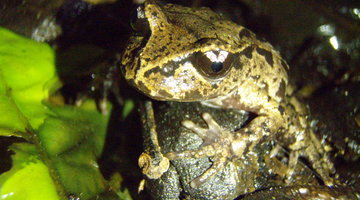Dr Phil Bishop, from the University of Otago, talks about the threats facing our native frogs. The most significant threat in New Zealand is introduced mammalian predators.
Point of interest: Before the arrival of humans and the introduction of mammalian predators, what threats do you think our native frogs faced? How were they adapted to deal with these threats?
Transcript
DR PHIL BISHOP
One of the key threats that faces the frogs are mammalian predators, and you can imagine that a frog has evolved over a long period of time in New Zealand with no mammalian predators at all, and most of its predators would hunt the frog by sight, so the frog’s immediate reaction that it’s evolved would be to sit motionless and well camouflaged.
So that’s a really good strategy if you are being hunted by a predator that is using sight to find you, but it’s the worst thing that you can do if you are being hunted by a mammalian predator who is trying to sniff you out. So the frog’s natural reaction is to freeze, and if it’s being hunted by a stoat or a weasel or a rat or a ferret or a hedgehog and the list goes on – and believe it or not, rats and mice do like to eat frogs. As well as eating insects and grains, the do like to eat a nice bit of protein.
So really, I would say the major threat in New Zealand has been the introduction of mammalian predators, and then secondarily, we have mucked up their environment, we’ve destroyed native forests, there is very few areas of native forest left – and that was the main habitat for native frogs. And then on top of that, we’ve got the more recent introduction of disease with the chytrid fungus as well.
Acknowledgements:
A Haigh, Department of Conservation. Crown copyright 2009.
Rod Morris, Department of Conservation. Crown copyright 2009.
Jennifer Barnard
Keven Law
Lars Karlsson
Prof. Ben Bell, Victoria University of Wellington.



